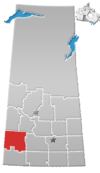Rural Municipality of Big Stick No. 141
Big Stick No. 141 | |
|---|---|
| Rural Municipality of Big Stick No. 141 | |
 Location of the RM of Big Stick No. 141 in Saskatchewan | |
| Coordinates: 50°11′06″N 109°31′37″W / 50.185°N 109.527°W[1] | |
| Country | Canada |
| Province | Saskatchewan |
| Census division | 8 |
| SARM division | 3 |
| Federal riding | Cypress Hills—Grasslands |
| Provincial riding | Cypress Hills |
| Formed[2] | December 11, 1911 |
| Government | |
| • Reeve | Edward Feil |
| • Governing body | RM of Big Stick No. 141 Council |
| • Administrator | Melinda Hammer |
| • Office location | Golden Prairie |
| Area (2016)[4] | |
| • Land | 821.4 km2 (317.1 sq mi) |
| Population (2016)[4] | |
| • Total | 136 |
| • Density | 0.2/km2 (0.5/sq mi) |
| Time zone | CST |
| • Summer (DST) | CST |
| Postal code | S0N 0Y0 |
| Area code(s) | 306 and 639 |
The Rural Municipality of Big Stick No. 141 (2016 population: 136) is a rural municipality (RM) in the Canadian province of Saskatchewan within Census Division No. 8 and SARM Division No. 3. It is located in southwest portion of the province.
History[edit]
The RM of Big Stick No. 141 incorporated as a rural municipality on December 11, 1911.[2] The RM takes its name from the alkali Bigstick Lake within its boundaries, which was named after the Big Stick Trail between Maple Creek and the South Saskatchewan River – notable for a large, solitary tree along its route. A Big Stick Lake post office also operated at SE-27-14-26-W3 from 1911 to 1925.[5]
Geography[edit]
Communities and localities[edit]
The following urban municipalities are surrounded by the RM.
Demographics[edit]
In the 2021 Census of Population conducted by Statistics Canada, the RM of Big Stick No. 141 had a population of 148 living in 60 of its 68 total private dwellings, a change of 8.8% from its 2016 population of 136. With a land area of 831.87 km2 (321.19 sq mi), it had a population density of 0.2/km2 (0.5/sq mi) in 2021.[8]
In the 2016 Census of Population, the RM of Big Stick No. 141 recorded a population of 136 living in 57 of its 74 total private dwellings, a -8.1% change from its 2011 population of 148. With a land area of 821.4 km2 (317.1 sq mi), it had a population density of 0.2/km2 (0.4/sq mi) in 2016.[4]
Government[edit]
The RM of Big Stick No. 141 is governed by an elected municipal council and an appointed administrator that meets on the first Wednesday of every month.[3] The reeve of the RM is Edward Feil while its administrator is Melinda Hammer.[3] The RM's office is located in Golden Prairie.[3]
References[edit]
- ^ "Pre-packaged CSV files - CGN, Canada/Province/Territory (cgn_sk_csv_eng.zip)". Government of Canada. July 24, 2019. Retrieved May 23, 2020.
- ^ a b "Rural Municipality Incorporations (Alphabetical)". Saskatchewan Ministry of Municipal Affairs. Archived from the original on April 21, 2011. Retrieved May 9, 2020.
- ^ a b c d "Municipality Details: RM of Big Stick No. 141". Government of Saskatchewan. Retrieved May 21, 2020.
- ^ a b c "Population and dwelling counts, for Canada, provinces and territories, and census subdivisions (municipalities), 2016 and 2011 censuses – 100% data (Saskatchewan)". Statistics Canada. February 8, 2017. Retrieved May 1, 2020.
- ^ Barry, Bill (2005). Geographic Names of Saskatchewan. Regina, Saskatchewan: People Places Publishing Ltd. ISBN 1-897010-19-2.
- ^ "Saskatchewan Census Population" (PDF). Saskatchewan Bureau of Statistics. Archived from the original (PDF) on September 24, 2015. Retrieved May 9, 2020.
- ^ "Saskatchewan Census Population". Saskatchewan Bureau of Statistics. Retrieved May 9, 2020.
- ^ "Population and dwelling counts: Canada, provinces and territories, census divisions and census subdivisions (municipalities), Saskatchewan". Statistics Canada. February 9, 2022. Retrieved April 13, 2022.


